Couple divided by Catalan crisispublished at 18:03 BST 10 October 2017
Pablo Insa Iglesias and Elisabeth Besó - on opposite sides
Couple divided by Catalonia question
Catalan President Carles Puigdemont says he will deliver on independence vote
He asks parliament to suspend the result of the referendum to enable talks
The disputed 1 October vote saw mass protests and violence between national police and demonstrators
Madrid says the vote was illegal and has promised to block any move towards secession
Catalan police are posted outside parliament in Barcelona, sealing off the grounds to the public
Jasmine Taylor-Coleman, Ellis Palmer and Gareth Evans
Pablo Insa Iglesias and Elisabeth Besó - on opposite sides
Couple divided by Catalonia question
Josep Maria Castellà, constitutional law professor at the University of Barcelona, has told the BBC the process of Spain enacting direct rule would take less than a week.
"Article 155 allows for many possibilities, with the limit being a total suspension of autonomy," he explains.
"Other options include the suspension of certain competencies, such as security. The important thing for the state will be to ensure control of ports, airports, communication centres and borders by forces of the Spanish state."
BBC producer Bruno Boelpaep explains
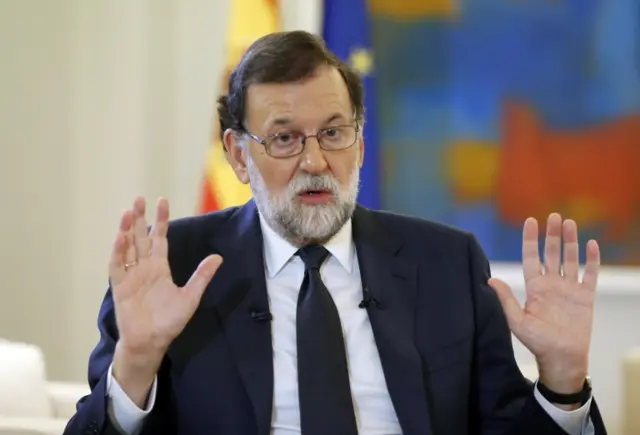 Image source, EPA
Image source, EPASpanish PM Mariano Rajoy has said he will take all measures necessary to ensure any declaration of independence has no practical effect.
This is the procedure the Spanish government would follow if it was to trigger Article 155 of the Spanish Constitution to suspend Catalonia’s autonomy:
Speculation is rife about the reasons Mr Puigdemont's address was delayed at the very last minute:
The BBC's Gavin Lee gives us a sense of how many people have turned out to watch the speech outside the Catalan parliament.
Allow X content?
This article contains content provided by X. We ask for your permission before anything is loaded, as they may be using cookies and other technologies. You may want to read X’s cookie policy, external and privacy policy, external before accepting. To view this content choose ‘accept and continue’.
Farmers have driven tractors decorated with the Catalan separatist flag into Barcelona to show their support for independence.
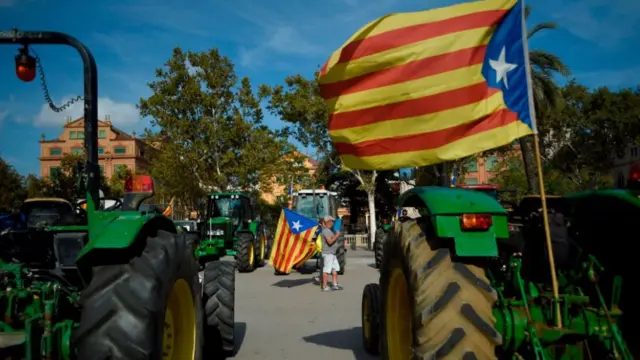 Image source, AFP
Image source, AFPTractors in central Barcelona
The BBC's Tom Burridge explains on the possible next moves for separatists and for Spain's government after the disputed referendum.
Catalan vote: What will happen next?
The BBC's Guy Hedgecoe, who is in Barcelona, wonders whether the postponement of Mr Puigdemont's speech could indicate a significant change of position.
Allow X content?
This article contains content provided by X. We ask for your permission before anything is loaded, as they may be using cookies and other technologies. You may want to read X’s cookie policy, external and privacy policy, external before accepting. To view this content choose ‘accept and continue’.
We're hearing that the Catalan leader's address has been put back, reportedly while party organisers hold a meeting.
Allow X content?
This article contains content provided by X. We ask for your permission before anything is loaded, as they may be using cookies and other technologies. You may want to read X’s cookie policy, external and privacy policy, external before accepting. To view this content choose ‘accept and continue’.
The International Monetary Fund has described the Catalan situation as "worrying" during a news conference in Washington DC.
Maurice Obstfeld, chief economist at the IMF, said it "causes a lot of uncertainty for both the Catalan and Spanish economies."
He said that both sides should "not act hastily, and negotiate. There are many potential benefits for both parties if they do."
Catalonia's future is of particular interest in Scotland, which held its own independence referendum in 2014 - the difference being that it was legal under UK law.
Speaking ahead of Mr Puigdemont's much-anticipated address, Scottish First Minister Nicola Sturgeon called for dialogue and said it was "time for the Spanish government to sit down with the government of Catalonia".
She said: "It is time for them to talk and find a way forward – a way forward that respects the rule of law, yes, but a way forward that also respects democracy and respects the right of the people of Catalonia to determine their own future.”
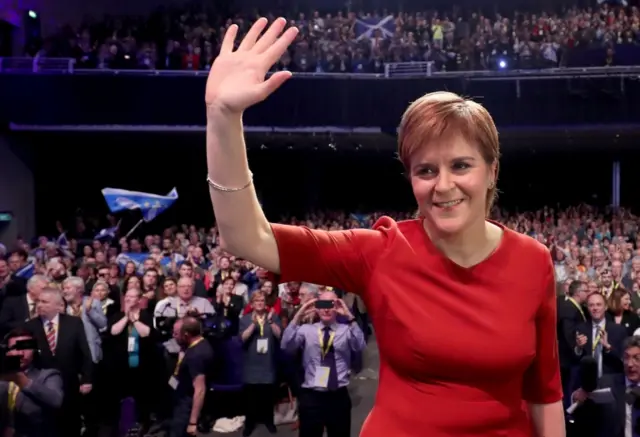 Image source, PA
Image source, PAIs Catalan independence unstoppable? What are the options for Spain? Read our BBC News analysis of the situation.
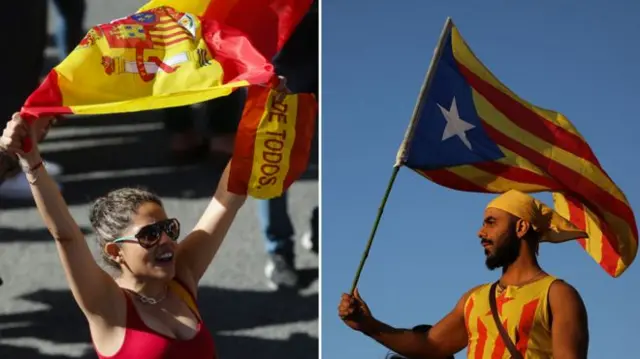 Image source, EPA/Getty Images
Image source, EPA/Getty ImagesPro-unity protester (left) and Catalan independence activist
Photographers jostled to get the perfect picture of Mr Puigdemont as he arrived at parliament just a short while ago.
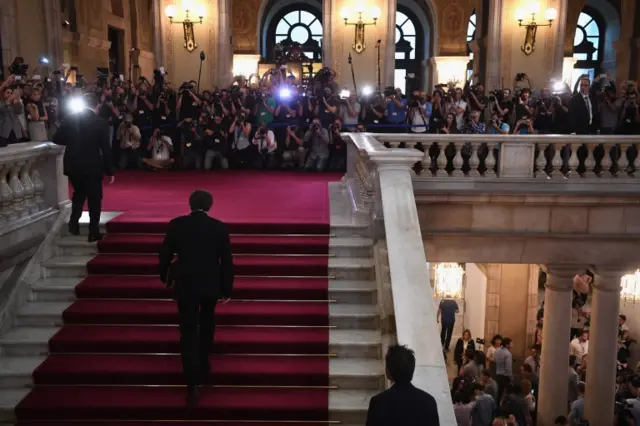 Image source, Getty Images
Image source, Getty ImagesEuropean Council President Donald Tusk is among those to have urged Mr Puigdemont not to declare independence. In his latest comments on the crisis, the EU leader said the consequences would be "obviously be bad for the Catalans, for Spain and for the whole of Europe".
"Let us always look for what unites us and not for what divides us. This is what will decide the future of our continent."
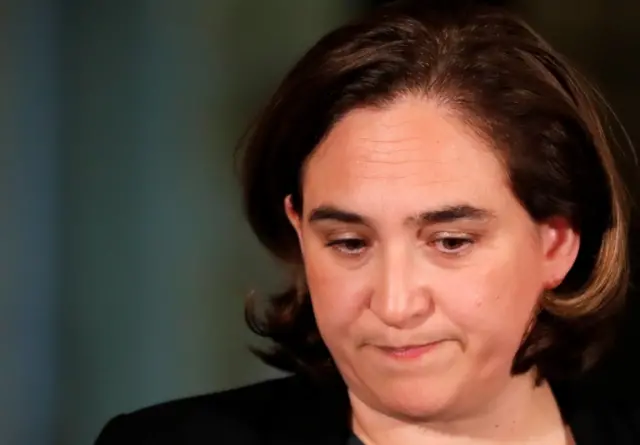 Image source, Reu
Image source, ReuCatalan leader Carles Puigdemont has faced growing pressure not to declare independence - including from influential Barcelona Mayor Ada Colau. Speaking on Monday, she called for de-escalation.
Quote Messagel'll again address Carles Puigdemont and Prime Minister Mariano Rajoy - I ask them not to take any decision that might blow up the possibility of any space for dialogue and mediation. That's without any doubt the most valiant act they can do now.
Ada Colau, Barcelona mayor
With only a short time to go, the Catalan leader has arrived at the region's parliament where he will give an address. BBC News producer Maria Byrne is outside the building where supporters have gathered.
Allow X content?
This article contains content provided by X. We ask for your permission before anything is loaded, as they may be using cookies and other technologies. You may want to read X’s cookie policy, external and privacy policy, external before accepting. To view this content choose ‘accept and continue’.
It is unclear whether Mr Puigdemont will follow through on his threat to make a unilateral declaration of independence. At a news conference in Barcelona earlier, the spokesman for Catalonia's regional government, Jordi Turull, revealed little about what Mr Puigdemont intends to say, but instead hit out at the Spanish government and lauded Catalonia's prosperity.
Quote MessageI want to denounce the pressure applied by the Spanish state that is intended to harm us, but is harming everyone... I have great confidence because the Catalan economy is very strong.
Jordi Turull
Our correspondents are following the latest developments in Barcelona and we'll also get the reaction in Madrid.
Allow X content?
This article contains content provided by X. We ask for your permission before anything is loaded, as they may be using cookies and other technologies. You may want to read X’s cookie policy, external and privacy policy, external before accepting. To view this content choose ‘accept and continue’.
Allow X content?
This article contains content provided by X. We ask for your permission before anything is loaded, as they may be using cookies and other technologies. You may want to read X’s cookie policy, external and privacy policy, external before accepting. To view this content choose ‘accept and continue’.
The BBC's Maria Byrne has been photographing pro-independence crowds in Barcelona.
Allow X content?
This article contains content provided by X. We ask for your permission before anything is loaded, as they may be using cookies and other technologies. You may want to read X’s cookie policy, external and privacy policy, external before accepting. To view this content choose ‘accept and continue’.
Catalan referendum: Yes or No?
Mr Puigdemont's address, which is due at 18:00 local time (16:00 GMT), comes after a vote on 1 October, which Catalan officials say resulted in almost 90% of voters backing independence. Turnout was put at 43%.
The vote was deemed illegal by Madrid and suspended by Spain's Constitutional Court. "No" voters largely boycotted the ballot and there were several reports of irregularities. National police were involved in violent scenes as they manhandled voters.